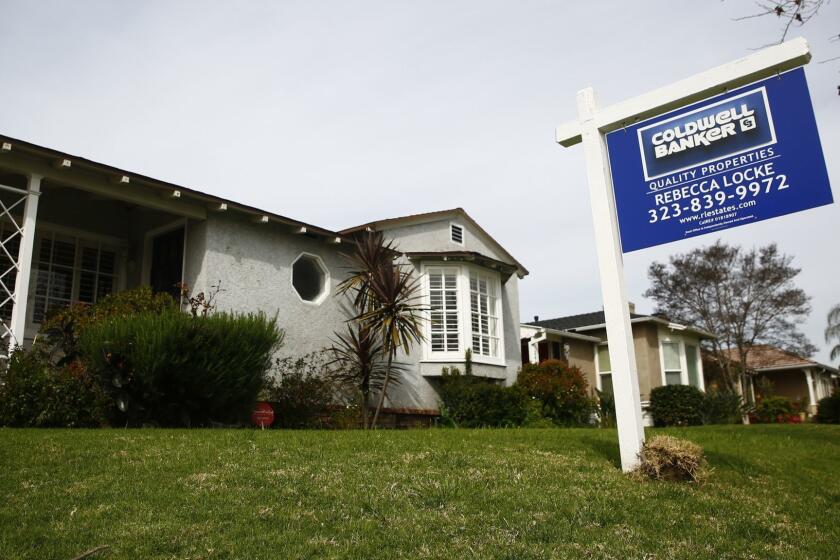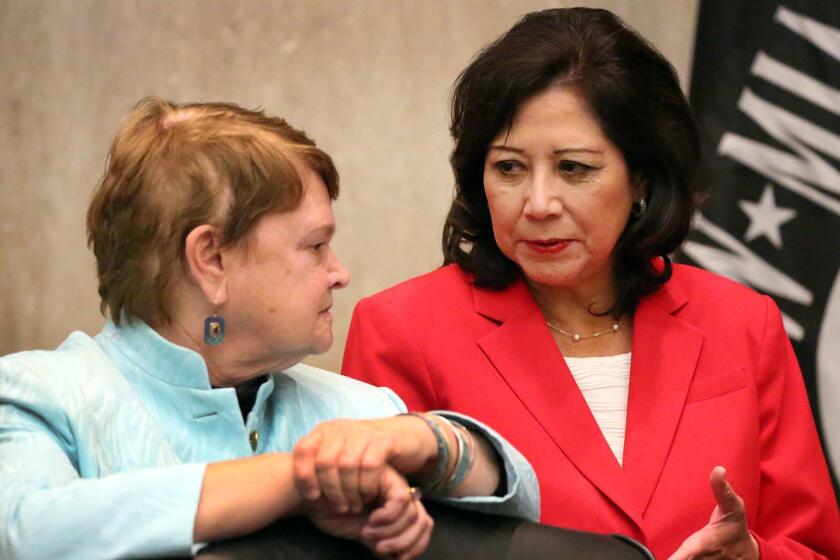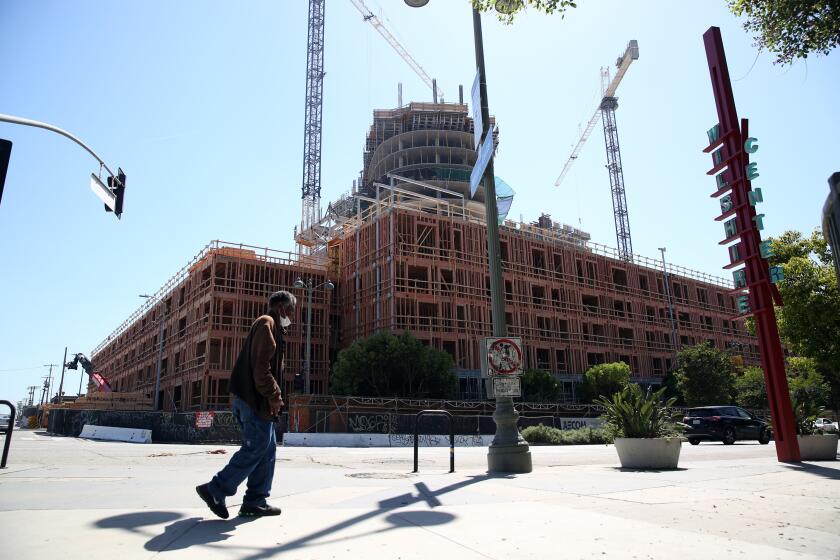You can skip mortgage payments for up to a year. Many fear what comes after that
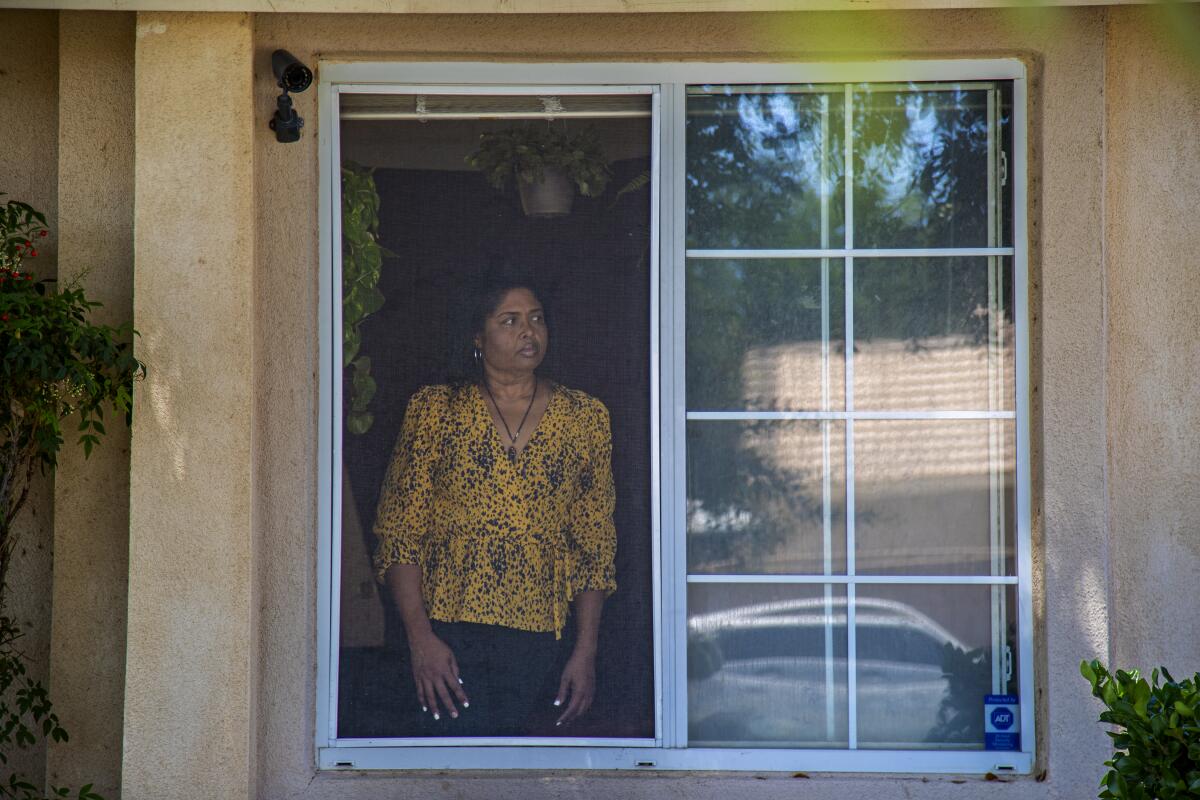
- Share via
In March, like millions of others, Thomas Taylor saw his income plummet.
The global pandemic left the 42-year-old furloughed from his two bartending jobs and staring down a $2,600 monthly mortgage payment on his Laguna Niguel condo.
Taylor reached out to his mortgage company for help but hit a wall. He wouldn’t have to pay for six months, he recalled being told over the phone, but would then have to pay back all missed payments — the equivalent of $15,600 — in one lump sum.
“I couldn’t come up with that in six months,” he said. “No way, not with no income right now.”
As the ranks of the unemployed have swelled, home owners have flooded their mortgage companies with requests for relief. Millions signed up for so-called mortgage forbearance programs that let borrowers delay payments or make partial payments while they wait for their financial situation to improve.
But there’s been mass confusion over how borrowers will pay back what they owe. And the fear of a looming lump-sum payment has caused some of them to skip the mortgage forbearance process altogether, sending them down risky alternative pathways.
The housing market has taken a hit as the coronavirus has spread. However, some buyers are still moving forward.
Under the federal CARES Act stimulus law, borrowers with government-backed mortgages — through the Federal Housing Administration, the Department of Veterans Affairs, the U.S. Department of Agriculture, Fannie Mae or Freddie Mac — received the right to skip at least six months of payments if they have a financial hardship tied to the novel coronavirus.
That covers most borrowers. Those with private mortgages didn’t get that guarantee. But many are still finding help through their financial institutions.
The law still requires borrowers to pay back any missed payments but wasn’t specific on how they’d do so. Government agencies insist that borrowers with government-backed mortgages don’t have to pay everything back at once.
However, consumer advocates say some mortgage companies have incorrectly told borrowers they must pay back all missed payments in a lump sum or have made vague comments that lead stressed-out consumers to assume that’s the case.
A government inspector general this week criticized mortgage companies for providing “incomplete, inconsistent, dated, and unclear guidance” to borrowers on their websites.
The Times spoke with four landlords and four tenants across Los Angeles County to understand how they’re coping with the fallout from the coronavirus.
Left to imagine the worst, borrowers told The Times they used credit card charges or withdrew money from savings to stay current on their mortgage payments. Taylor turned to family for help. Another person decided to pay late, risking a late fee and damage to her credit.
Other repayment options are offered by servicers, such as loan modifications. But some advocates describe them as cumbersome. They worry that a foreclosure wave will follow once payments resume if the process isn’t streamlined.
“It’s a recipe for disaster,” Bruce Marks, chief executive of the Neighborhood Assistance Corp. of America, said of the current system. “This is going to be a far worse mortgage crisis than in 2008. You are going to have many more homeowners lose their homes.”
Government agencies say they are taking steps to limit confusion among borrowers and servicers. They’ve issued guidance to mortgage companies that lay out other repayment options companies must offer if borrowers can’t afford a lump sum.
Following stay-at-home orders due to the coronavirus, Southern California home buyers have pulled sharply back. But prices seem stable for now.
Those include repayment plans in which a homeowner’s monthly mortgage payment increases for a time to make up for missed payments. Other modifications extend the length of a loan and keep monthly payments the same or lower than before the forbearance.
Federal agencies have urged consumers to file complaints with the Consumer Financial Protection Bureau if they believe that their mortgage company isn’t following the rules. On Monday, the Federal Housing Finance Agency, regulator of Fannie Mae and Freddie Mac, issued a news release to “combat ongoing misinformation.”
“During this national health emergency, no one should be worried about losing their home,” said the statement from FHFA Director Mark Calabria. “No lump sum is required at the end of a borrower’s forbearance plan for [Fannie Mae and Freddie Mac] mortgages.”
The same is true for USDA, FHA and VA loans, the Consumer Financial Protection Bureau says.
As the forbearance process moves forward, a lot rests on mortgage companies playing by the rules and being clear when doing so.
Even in normal times, the U.S. mortgage market is a complex place, where borrowers may not know who actually owns or backs their loan. Loans are sold from one entity to another, placing borrowers with new mortgage servicers that manage loans and pass along payments to investors.
Now homeowners are being asked to navigate that system amid a global pandemic and fear of an economic depression. Some consumer advocates say nonbank servicers that are not well-capitalized also have a strong financial incentive to discourage forbearance, because for a time they still must front missed payments to investors.
Taylor, the Laguna Niguel homeowner, didn’t know much about his loan. He knew it was FHA insured, but said when he called the company listed prominently on his mortgage documents, Lakeview Loan Servicing, he didn’t know an FHA loan gave him certain benefits.
He said he got through to a person in a call center who told him he had to pay everything back in six months, prompting him to ask if there were other repayment options.
“She said, ‘I don’t have that information available,’” Taylor recalled.
He then tried “every number on the back of our invoice” and then called a number he found online for LoanCare, another company that was listed as his “subservicer” in smaller print on mortgage documents. He said he couldn’t get through to anyone.
Lakeview’s website says borrowers should contact their “subservicer” for questions on their mortgage. After The Times inquired about Taylor’s situation with Lakeview, Taylor said someone from the company called and explained that if he got into forbearance he wouldn’t have to pay everything back in a lump sum.
Renters in unincorporated L.A. County now have new tools to prevent eviction following a vote by the Board of Supervisors in response to the coronavirus.
He said he was given another phone number and a website for more information and plans to look into forbearance again.
“This was the first time I am hearing from someone who actually knows what they are talking about,” he said he told the Lakeview representative. “She was like, ‘I’m so sorry.’”
A company spokesperson said: “Upon learning that a customer of one of our servicers was having trouble navigating the forbearance process, a senior representative of Lakeview reached out to ensure that the individual better understood the process and the options available to them. We understand that this is a difficult time for homeowners across the country and we’re committed to ensuring they have the right information to best navigate challenges due to the COVID-19 pandemic.”
LoanCare would not directly comment on Taylor’s experience but said that borrowers seeking forbearance under the CARES Act are not required to pay a lump sum and that the company discusses with borrowers what other options they may have to repay missed payments.
Sara Singhas, director of loan administration at the Mortgage Bankers Assn., said the mortgage forbearance process has been a challenge for servicers. She cited a flood of borrowers calling companies that were “also experiencing workplace disruption with many of their staff ... having to work off-site.” She said companies have hired additional staff and bolstered their websites to handle COVID-19 requests.
Consumer groups recommend borrowers check their servicer’s website because many companies now allow people to apply online to avoid long wait times.
Still, those websites are not always helpful. The Department of Housing and Urban Development Inspector General released a report this week that found “FHA servicer websites provided incomplete, inconsistent, dated, and unclear guidance to borrowers related to their forbearance options under the CARES Act.”
Construction projects of every shape and size — deemed essential by the state — have continued across Los Angeles.
Among the issues the inspector general identified was a tendency to provide information about non-lump-sum payment options only after “statements about the need for borrowers to pay missed payments in a lump sum.”
As of Wednesday, LoanCare had a forbearance application available on its website. And it listed a repayment plan and loan modification as possible options for repayment, though that came after the company said “any unpaid payments will become due at the end of the forbearance period.”
Once a loan is in forbearance, servicers of federally backed loans are required to get back in touch with borrowers before the forbearance period ends and go down a list of programs to find an affordable option for repayment and grant it if a person qualifies.
The CARES Act also gives borrowers, after six months of forbearance, the option of extending forbearance for another six months, capping the total time a borrower can miss payments at a year.
The options for repayment differ slightly among different types of government loans. FHA has rolled out a “COVID-19 National Emergency Partial Claim” that moves the missed payments into a second, interest-free mortgage that isn’t due until the first loan is paid off.
Fannie Mae and Freddie Mac have a “cap and extend modification” that extends the length of the loan and keeps mortgage payments the same as before the forbearance.
Other programs can lower monthly payments. But there is a limit to how low payments can go, so someone who never regains their job might still face foreclosure.
A group of attorneys general, including California Atty. General Xavier Becerra, have asked for a simpler process in letters to FHFA and HUD, which overseas FHA.
The state law enforcement officials said that mortgage servicers already appear overwhelmed and that they have “grave doubts” those companies can effectively manage an “unprecedented” flood of borrowers emerging from COVID-19 forbearance over the next year who will need individual evaluation for the right repayment option.
Rather, they urged that FHFA and HUD require servicers to automatically tack on missed payments to the end of a borrower’s loan in the form of monthly payments — so that a 30-year loan, for instance, becomes a 30½-year loan if someone misses six months.
Then, if people still need help, more complicated modifications could be considered. State officials also called for the agencies to wipe away restrictions that limit repayment options if people were delinquent before the pandemic.
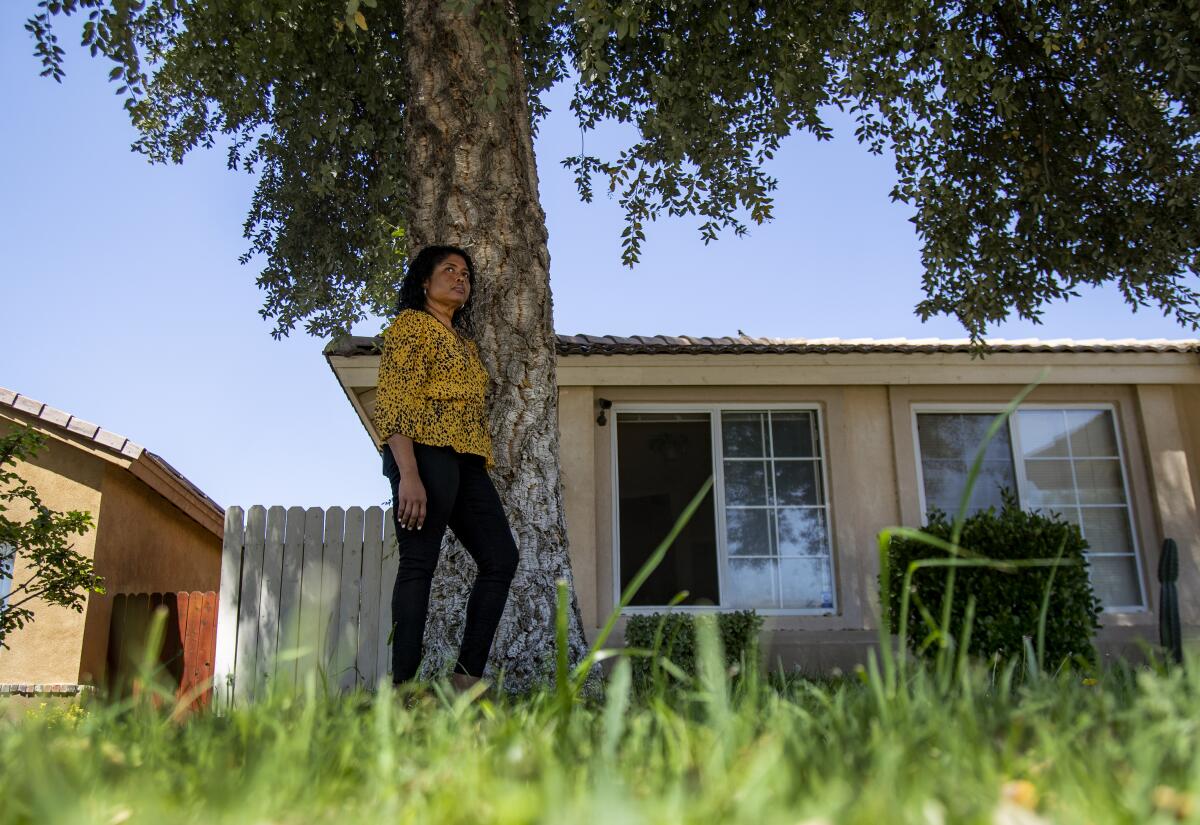
Meanwhile, Arane Pineda, a 52-year-old assistant teacher from San Jacinto, is already overwhelmed. She is furloughed and her husband, a truck driver, is working less.
Pineda tried to get a forbearance through LoanCare and said she was given three options for repayment on her FHA loan: a lump payment, a repayment plan that raised her monthly payments each month until missed payments were paid off, or a loan modification that changed the lifetime term of her loan. She saw the first two as unaffordable and worried she wouldn’t qualify for the third.
Instead, she decided to pass on the forbearance and waited until she had the money to pay her $1,764 April mortgage payment. She said she got hit with a late fee, but thinks she may avoid a ding to her credit.
Pineda said she didn’t recall LoanCare explaining the FHA’s so-called partial claim second mortgage, or letting her know that she could make whatever payments she can manage during a forbearance and thus avoid a late fee and owe less when the period ends. She had been planning to pay late again in May. But after The Times let her know she could make partial payments while in forbearance, she said she plans to call LoanCare back and inquire again about that option.
LoanCare did not comment directly on Pineda’s experience, but a spokesperson said the company’s president would reach out to her and Taylor directly.
Said Pineda: “We lost a house in 2008 and I am so nervous and so afraid because we were just able to get back into home owning. I can’t do this again.”
More to Read
Sign up for Essential California
The most important California stories and recommendations in your inbox every morning.
You may occasionally receive promotional content from the Los Angeles Times.


